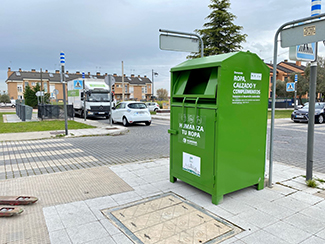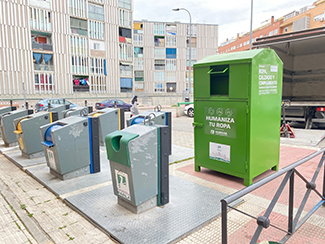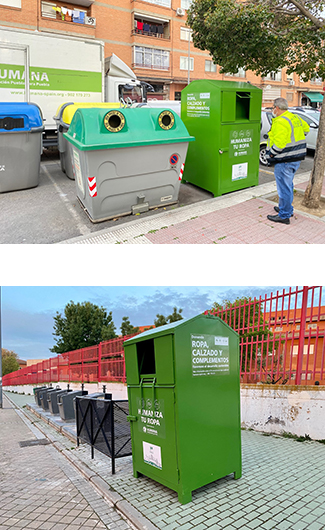consent_cookie
Duración: 1 year
Stores the user's cookie consent state
11-05-2021
Humana has started the selective collection service for textile waste in Parla (Comunidad de Madrid) by installing a network of 100 containers, green in color and identified with the logos of the Foundation and the City Council, respectively. In them it is already possible to deposit clothes, footwear, accessories and home textiles. 24 hours a day, 7 days a week.
Fundación Pueblo para Pueblo is awarded Lot 1 of the used clothing collection contract, after the corresponding bidding process promoted by the Consistory. In the tender, technical and environmental criteria have prevailed, fundamental axes of green and sustainable public procurement. The contract between the Parla City Council and the Foundation has a duration of 3 years, extendable for a total of another 2.
Savings for municipalities
It is a free service both for the City Council and for the residents of Parla. It also represents a saving for municipal coffers, since the selective collection of textiles allows reducing the volume of waste that ends up in landfills, and with it, the dumping rates, estimated at 150 euros per ton.
To provide the service, the Foundation has made a significant investment in containers, vehicles, technological tools and human resources. For example, the service includes the use of volumetric sensors, which provide real-time information on the filling level of the containers. This information makes it possible to optimize the collection routes, promoting fuel and resource savings. The sensors also report on changes in temperature inside the container, which makes it possible to detect possible fires. Humana has a container search engine on its website, where it is very easy to find the location of the collection points located in Parla.
Environmental benefit of sustainable textile management
The reuse and recycling of textiles contribute to saving resources, protecting the environment and fighting climate change. They make it possible to reduce the volume of waste that ends up in landfills and help mitigate the emission of greenhouse gases.
Thus, for every kilo of clothing that is reused and is not taken to a treatment center for incineration or final disposal, the emission of 3,169 kg of CO2 is avoided, according to data from the European Commission itself.
The tender process has also taken into account the incorporation of zero or low emission vehicles into the service, in order to help reduce the municipality's carbon footprint and its contribution to the generation of Greenhouse Gases (GHG).
The garments deposited in Humana's containers in Parla will be taken to the Foundation's preparation plant for reuse in Leganés. With 10,000 square meters of surface dedicated to textile management, it is the largest facility of its kind in Spain.
Both the collection and the processing of the textile is carried out with all the sanitary guarantees and complying with the strictest COVID protocols.
Humana's goal is to consolidate the selective collection of used clothing and its preparation for reuse as a fundamental part of waste management. A management that has been consolidated as a fundamental axis of the operation of cities, even more so due to the pandemic, being an essential service for the population, in a very complex socio-economic moment at a global level, full of challenges and difficulties.
The destination of the garments prepared for reuse in Leganés is as follows (based on the data recorded in 2020 in the entire plant):
Social benefit of sustainable textile management
“By making the most of the textile and giving it a second life, we favor a circular economy model. We convert waste into resources and endow them with a social purpose since the garments that are recovered are an asset that, properly managed, becomes an engine of employment -Humana generates one job for every 30,000 kg of recovered textiles- and of generator of funds for development cooperation in the Southern Hemisphere and of local support and urban and social agriculture in our country. This is how we contribute to a more economically and socially sustainable society, ”says Beatriz Martín, Head of the Collection Department in Madrid and the Downtown Area of Humana Fundación Pueblo para Pueblo.
"For all this," adds Martín, we thank in advance all the residents of Parla for their collaboration. "


